Related Research Articles

Maxis is an American video game developer and a division of Electronic Arts (EA). The studio was founded in 1987 by Will Wright and Jeff Braun, and acquired by Electronic Arts in 1997. Maxis is best known for its simulation games, including The Sims, Spore and SimCity.

The Sims is a social simulation video game developed by Maxis and published by Electronic Arts in 2000. The game allows players to create and control virtual people, called "Sims", and manage their daily lives in a suburban setting. The game features an open-ended gameplay, where players can choose their own goals and objectives, and customize their Sims' appearance, personality, skills, relationships, and environment. A series of expansion packs were also released that add new content and features to the game, such as new careers, items, locations, and scenarios.

SimCity 2000 is a city-building simulation video game jointly developed by Will Wright and Fred Haslam of Maxis. It is the successor to SimCity Classic and was released for Apple Macintosh and MS-DOS personal computers in 1993, after which it was released on many other platforms over the following years, such as the Sega Saturn and SNES game consoles in 1995 and the PlayStation in 1996.
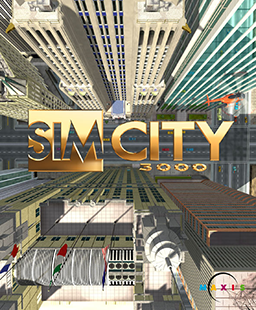
SimCity 3000 is a city building simulation video game released in 1999, and the third major installment in the SimCity series. It was published by Electronic Arts (EA) and developed by series creator Maxis. It was released for Microsoft Windows, Macintosh, and, through an arrangement with Loki Games, Linux.
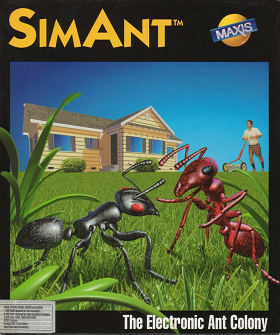
SimAnt: The Electronic Ant Colony is a 1991 life simulation video game by Maxis and the company's third product, focusing on the lifecycle of ants. It was designed by Will Wright. In 1992, it was named "Best Simulation Game" at the Software Publishers Association's Codie awards. SimAnt was re-released in 1993 as part of the SimClassics Volume 1 compilation alongside SimCity Classic and SimLife for MS-DOS, Mac and Amiga. In 1996, SimAnt, alongside several of Maxis' simulation games were re-released under the Maxis Collector Series with greater compatibility with Windows 95 and differing box art, including the addition of Classics beneath the title.

Streets of SimCity is a racing and vehicular combat 3D computer game published by Maxis and Electronic Arts in November 1997. The game features the ability to visit any city created in SimCity 2000, as well as a network mode, allowing for players to play deathmatches with up to seven other players. It is the last Maxis game to be developed and released without supervision by Electronic Arts, which acquired Maxis in the two months leading up to release.

SimsVille is a cancelled life simulation video game developed by Maxis. The game was conceived as a hybrid between the gameplay of The Sims, a social simulation game, and the city-building game SimCity. Development of SimsVille was undertaken over two years by the Maxis development team for SimCity in an attempt to expand The Sims franchise. Following delays to the game's release window, Maxis discontinued development of SimsVille in September 2001, citing concerns with the quality of the gameplay experience. Despite its cancellation, design elements of SimsVille would influence later Maxis products, such as the community features of The Sims: Hot Date and the integration of Sims into SimCity 4.
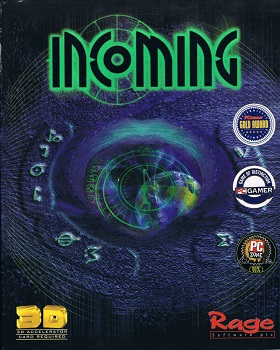
Incoming is a 3D shooter video game developed and published by Rage Software. The game was first released for Microsoft Windows in mid-1998, and was followed by a Dreamcast version, which was released in Japan on December 17, 1998, in Europe on October 14, 1999, and in North America on September 15, 1999. Set in the near-future of 2009, the game primarily revolves around controlling vehicles and turrets to fight alien invaders of Earth in one of the campaign modes, the arcade mode, and with or against another player. Some levels include brief real-time strategy segments.
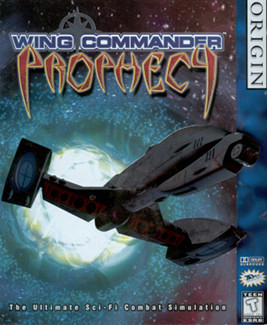
Wing Commander: Prophecy is the fifth installment in the Wing Commander science fiction space combat simulator franchise of computer games. The game was released in 1997 for Windows, produced by Origin Systems and distributed by Electronic Arts. In 2003, a Game Boy Advance conversion with added multiplayer was produced by Italy-based Raylight Studios and distributed by Destination Software.
EA Salt Lake was an American video game developer located in Salt Lake City, Utah, United States. It was owned by video game publisher Electronic Arts (EA).

Jane's World War II Fighters is the 1998 combat flight simulation video game. Set in the European theatre of operations during World War II, it is part of the Jane's Combat Simulations franchise. The game was considered a commercial failure, and contributed to the end of the Jane's Combat Simulations line.

Jane's F-15, also known as simply F-15, is a combat flight simulator video game developed and released by Electronic Arts in 1998 for the PC. It models the McDonnell Douglas F-15E Strike Eagle. EA's 2000 Jane's F/A-18 used an improved version of F-15's game engine.
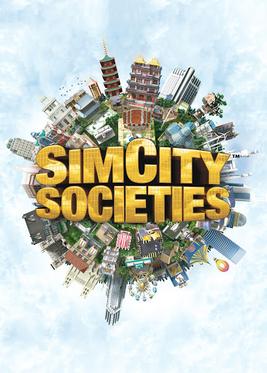
SimCity Societies is a city-building simulation video game developed by Tilted Mill Entertainment and published by Electronic Arts, and is part of the SimCity series. The gameplay is significantly different from previous SimCity titles, with a greater focus on social development. SimCity Societies was released in 2007, and received mixed reviews, with praise for the game's improved accessibility and visuals, but criticism for being oversimplified and having poor performance.

The Sims is a series of life simulation video games developed by Maxis and published by Electronic Arts. The franchise has sold nearly 200 million copies worldwide, and is one of the best-selling video game series of all time. It is also part of the larger Sim series, started by SimCity in 1989.

Iron & Blood: Warriors of Ravenloft is a 3D fighting game released for PC and PlayStation.
Cinematronics, LLC, later known as Maxis South, was an American developer of computer games for the PC and Mac, based in Texas and founded in 1994 by David Stafford, Mike Sandige and Kevin Gliner. They developed Tritryst for Virgin Interactive, Full Tilt! Pinball for Maxis, and Jack Nicklaus 4 for Accolade. The Space Cadet pinball table from Full Tilt! was also included with Microsoft Plus 95 and several versions of Microsoft Windows.

Andretti Racing is a video game developed by American studios High Score Productions and Stormfront Studios and published by EA Sports for the PlayStation and Sega Saturn in 1996, and for Windows in 1997. The game's title refers to legendary racing drivers Mario Andretti and Michael Andretti.

NBA Fastbreak '98 is a basketball simulator released for the Sony PlayStation in 1997. It takes place during the 1997-98 National Basketball Association season. It was published by Midway Games and GT Interactive. Originally announced under the title "Hardwood Heroes", the game was released with minimal changes as NBA Action 98 on Sega Saturn and Microsoft Windows, published by Sega. Another version was being developed by Z-Axis for the Nintendo 64 under the title "NBA Fast Break 64", with a prospective November 1997 release, but it was cancelled.

U.S. Navy Fighters is a combat flight simulation game developed and published in 1994 by Electronic Arts for DOS PCs. The game was programmed by Brent Iverson, who previously worked on EA's 1991 release Chuck Yeager's Air Combat. The U.S. Navy Fighters expansion pack Marine Fighters and a "Gold" compilation were both released in 1995. Later that year, Electronic Arts added graphical acceleration support for the game via the Nvidia NV1 when the chip was announced.
References
- 1 2 "Maxis South Titles Canceled". GameSpot . July 30, 1997. Archived from the original on February 21, 1999. Retrieved July 30, 2022.
- ↑ Keighley, Geoff. "SIMply Divine: The Story of Maxis Software: But It's 3D!". GameSpot. Archived from the original on April 4, 2005.
- ↑ "The Mindwarp [PC – Cancelled]". Unseen64. Retrieved 9 February 2024.
- ↑ Olafson, Peter (May 1996). "A Break in the Action - Inside Action". Computer Gaming World . No. 142. Ziff Davis. p. 143.
- 1 2 Breckon, Nick (12 October 2009). "New Images of Maxis' Cancelled SimMars, SimCastle Games Revealed". Shacknews . Gamerhub. Retrieved 9 February 2024.
- ↑ "SimMars". IGN . Ziff Davis. 20 July 1999. Retrieved 9 February 2024.